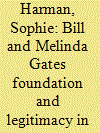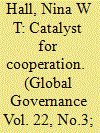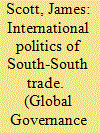|
|
|
Sort Order |
|
|
|
Items / Page
|
|
|
|
|
|
|
| Srl | Item |
| 1 |
ID:
150581


|
|
|
|
|
| Summary/Abstract |
The Bill and Melinda Gates Foundation brings to light the legitimacy problem with global philanthropy. The legitimacy problem here is twofold: first, with regard to the criteria used to assess the presence or absence of legitimacy in global governance; and, second, how analysis of legitimacy does not fully account for how we understand the legitimate basis of rule drawn from private wealth. This article begins to address this lacuna by analyzing the legitimacy of an actor that wields considerable authority in the field of global health politics and has growing prominence in contemporary global governance, the Bill and Melinda Gates Foundation.
|
|
|
|
|
|
|
|
|
|
|
|
|
|
|
|
| 2 |
ID:
150582


|
|
|
|
|
| Summary/Abstract |
Climate change is predicted to lead to an increasing frequency of natural disasters and humanitarian emergencies, yet scholars have not examined how the humanitarian community is responding to this issue. This article examines its initial engagement with the climate change regime and finds it was remarkably coordinated. Humanitarian agencies coauthored submissions to the UN Framework Convention on Climate Change, and the leaders of major humanitarian organizations spoke on co-organized panels on the humanitarian perils of climate change. In fact, the overarching trend was cooperation, not competition, among humanitarian agencies. This is an intriguing finding as it runs counter to the dominant account of a humanitarian marketplace in which actors are constantly competing for resources. Instead, this article suggests that the Inter-Agency Standing Committee played a significant role in mobilizing and coordinating humanitarian organizations' initial efforts. It highlights how and to what extent institutionalized cooperation between international organizations enables further cooperation in new issue areas and regimes. Scholars of international organizations, global environmental politics, and humanitarianism will be interested in how cooperation emerged in the humanitarian regime and shaped subsequent interaction with the climate change regime.
|
|
|
|
|
|
|
|
|
|
|
|
|
|
|
|
| 3 |
ID:
150585


|
|
|
|
|
| Summary/Abstract |
South-South trade has become a core component of the contemporary trade debate, but the idea of using preferential trade agreements among developing countries to foster industrialization and diminish dependence on the North has a long history. This article examines the North-South and South-South politics surrounding two efforts to operationalize this idea—the Protocol Relating to Trade Negotiations Among Developing Countries in the General Agreement on Tariffs and Trade and the Global System of Trade Preferences Among Developing Countries within the UN Conference on Trade and Development. It argues that the rich world has been somewhat obstructive in these efforts, but ultimately the primary cause for the weakness of these agreements is traced to failure by the Global South to make good on the rhetoric surrounding economic cooperation and South-South solidarity. Lessons from this history must be learned if current efforts to extend the GSTP are to bring greater benefits, particularly to the least developed.
|
|
|
|
|
|
|
|
|
|
|
|
|
|
|
|
| 4 |
ID:
150579


|
|
|
|
|
| Summary/Abstract |
ASIAN MEGACITIES HAVE INFAMOUSLY HIGH AIR POLLUTION, USUALLY THE RESULT
of privileging economic growth over the environment. It is thus noteworthy
when conurbations in Asia address both. The city of Seoul, Korea is a laudable
example
|
|
|
|
|
|
|
|
|
|
|
|
|
|
|
|
| 5 |
ID:
150583


|
|
|
|
|
| Summary/Abstract |
In July 2014 during the sixth BRICS summit, the leaders of Brazil, Russia, India, China, and South Africa launched the Fortaleza Declaration and Action Plan, suggesting a further intensification and institutionalization of their cooperation in the field of foreign policy, including within the framework of the United Nations. This article examines the extent to which the intensification of BRICS cooperation in the field of foreign policy is reflected in their voting patterns in the UN General Assembly. It presents an original dataset of the degree of voting cohesion among the five BRICS countries. It demonstrates that, overall, there is no significant increase in the degree of voting cohesion since the start of the consultations in the BRIC framework in 2006.
|
|
|
|
|
|
|
|
|
|
|
|
|
|
|
|
| 6 |
ID:
150580


|
|
|
|
|
| Summary/Abstract |
While significant obstacles to the realization of the Responsibility to Protect in practice remain, it has nonetheless made considerable progress in transforming from an idea to an emerging norm. At the same time, however, its sister component, the Responsibility to Rebuild has elicited less scholarly and policy attention. The lack of attention to rebuilding responsibilities has been made all the more urgent by the violent aftermath of the first protection intervention in Libya in 2011. Against this backdrop, the article examines the way in which the Responsibility to Rebuild is understood and operationalized, with reference to Libya and Côte d'Ivoire, theaters of two recent protection interventions. The conceptual evolution of the Responsibility to Rebuild reveals a distinct shift toward a more statist understanding of the rebuilding phase; what was initially considered a part of the wider international protection responsibility has come to be viewed as a domestic responsibility. This recalibration of the responsibility to rebuild stems from the concept's association with the reactive element of R2P as well as from the changes in the wider normative environment. The more statist understanding of rebuilding responsibilities has manifested itself not only in the emphasis on domestic ownership of the rebuilding process in the wake of protection interventions, but also in the reconceptualization of the wider international Responsibility to Rebuild as a narrower responsibility to assist in building the capacity of the state subjected to protection intervention. This has been problematic in policy terms as the attempt to build capacity through the standard state-building measures has resulted at best in negative peace and at worst in armed violence.
|
|
|
|
|
|
|
|
|
|
|
|
|
|
|
|
| 7 |
ID:
150578


|
|
|
|
|
| Summary/Abstract |
“THROUGHOUT HUMAN HISTORY, IN ANY GREAT ENDEAVOR REQUIRING THE
common effort of many nations and men and women everywhere, we have
learned—it is only through seriousness of purpose and persistence that we
ultimately carry the day. We might liken it to riding a bicycle. You stay
upright and move forward so long as you keep up the momentum.”1 This
statement by UN Secretary-General Ban Ki-moon resonates with the great
endeavor to move forward the global agenda on women, peace, and security.
While there has been movement on that agenda, the journey has been
slow. Occasional dips in the road have propelled the agenda forward resulting
in new resolutions, summits, agreements, and other initiatives designed
to raise awareness in response to media-driven sympathy for the issue.
However, this rapid gain in momentum would invariably be followed by a
slow uphill climb of inadequate fund raising, institution building, and sustainable
programming toward the ever-distant moving goalposts of gender
equality and women’s rights
|
|
|
|
|
|
|
|
|
|
|
|
|
|
|
|
| 8 |
ID:
150584


|
|
|
|
|
| Summary/Abstract |
The World Bank has been widely critiqued as a source of development norms. Yet one aspect of its activities has received relatively little academic attention: the socialization of development norms through training programs. This article addresses this gap in the literature by analyzing changes in the curricula, pedagogy, and methodology of the Economic Development Institute and the World Bank Institute—the teaching and learning arm of the World Bank. The article argues that, unlike the coercive nature of World Bank loan conditionality, the two teaching institutes have operated quietly in the background attempting to persuasively habitualize and naturalize member country participants into accepting particular understandings of and approaches to development as best practice and common sense. It concludes that the institutes have been active in the creation of toolkits used to socialize individuals into accepting and following World Bank development norms.
|
|
|
|
|
|
|
|
|
|
|
|
|
|
|
|
|
|
|
|
|